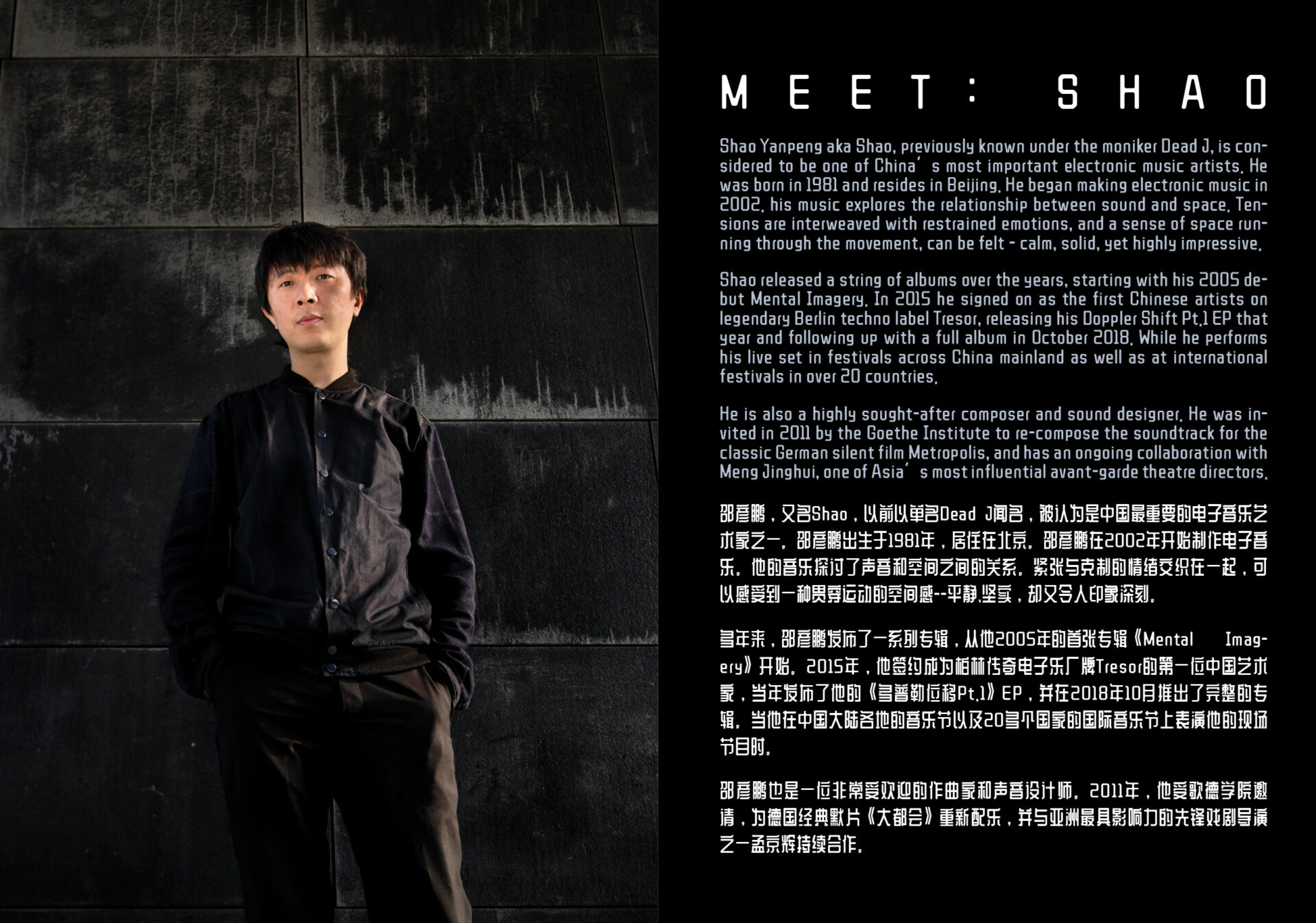
Shao Yanpeng aka Shao, previously known under the moniker Dead J, is considered to be one of China’s most important electronic music artists. He was born in 1981 and resides in Beijing. He began making electronic music in 2002. his music explores the relationship between sound and space. Tensions are interweaved with restrained emotions, and a sense of space running through the movement, can be felt – calm, solid, yet highly impressive.
Shao released a string of albums over the years, starting with his 2005 debut Mental Imagery. In 2015 he signed on as the first Chinese artists on legendary Berlin techno label Tresor, releasing his Doppler Shift Pt.1 EP that year and following up with a full album in October 2018. While he performs his live set in festivals across China mainland as well as at international festivals in over 20 countries.
He is also a highly sought-after composer and sound designer. He was invited in 2011 by the Goethe Institute to re-compose the soundtrack for the classic German silent film Metropolis, and has an ongoing collaboration with Meng Jinghui, one of Asia’s most influential avant-garde theatre directors.
邵彦鹏,又名Shao,以前以单名Dead J闻名,被认为是中国最重要的电子音乐艺术家之一。邵彦鹏出生于1981年,居住在北京。邵彦鹏在2002年开始制作电子音乐。他的音乐探讨了声音和空间之间的关系。紧张与克制的情绪交织在一起,可以感受到一种贯穿运动的空间感–平静、坚实,却又令人印象深刻。
多年来,邵彦鹏发布了一系列专辑,从他2005年的首张专辑《Mental Imagery》开始。2015年,他签约成为柏林传奇电子乐厂牌Tresor的第一位中国艺术家,当年发布了他的《多普勒位移Pt.1》EP,并在2018年10月推出了完整的专辑。当他在中国大陆各地的音乐节以及20多个国家的国际音乐节上表演他的现场节目时。
邵彦鹏也是一位非常受欢迎的作曲家和声音设计师。2011年,他受歌德学院邀请,为德国经典默片《大都会》重新配乐,并与亚洲最具影响力的先锋戏剧导演之一孟京辉持续合作。
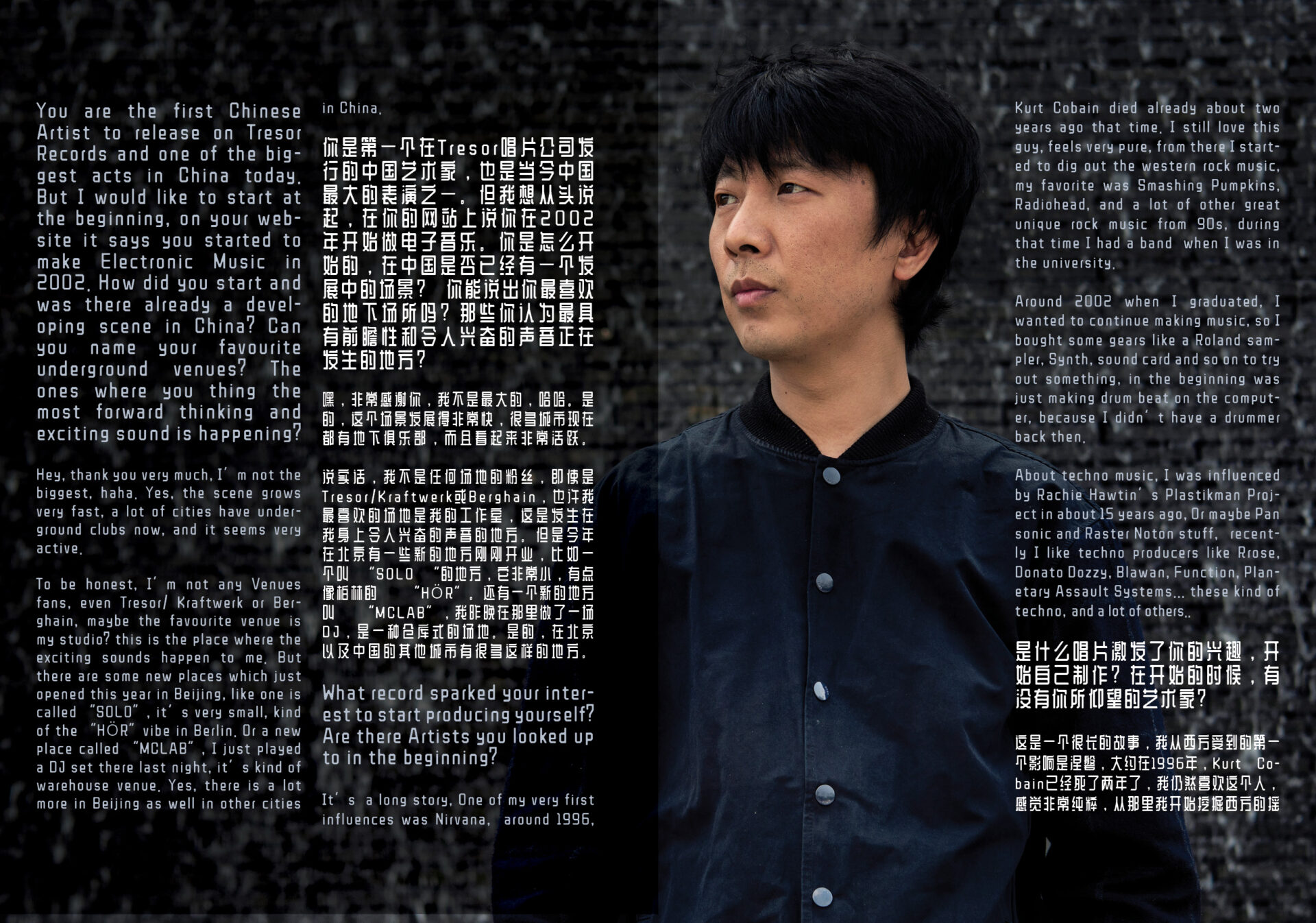
You are the first Chinese Artist to release on Tresor Records and one of the biggest acts in China today. But I would like to start at the beginning, on your website it says you started to make Electronic Music in 2002. How did you start and was there already a developing scene in China? Can you name your favourite
underground venues? The ones where you thing the most forward thinking and exciting sound is happening?
Hey, thank you very much, I’m not the biggest, haha. Yes, the scene grows very fast, a lot of cities have underground clubs now, and it seems very active.
To be honest, I’m not any Venues fans, even Tresor/ Kraftwerk or Berghain, maybe the favourite venue is my studio? this is the place where the exciting sounds happen to me. But there are some new places which just opened this year in Beijing, like one is called “SOLO”, it’s very small, kind of the “HÖR”vibe in Berlin. Or a new place called “MCLAB”, I just played a DJ set there last night, it’s kind of warehouse venue. Yes, there is a lot more in Beijing as well in other cities in China.
你是第一个在Tresor唱片公司发行的中国艺术家,也是当今中国最大的表演之一。但我想从头说起,在你的网站上说你在2002年开始做电子音乐。你是怎么开始的,在中国是否已经有一个发展中的场景? 你能说出你最喜欢的地下场所吗?那些你认为最具有前瞻性和令人兴奋的声音正在发生的地方?
嘿,非常感谢你,我不是最大的,哈哈。是的,这个场景发展得非常快,很多城市现在都有地下俱乐部,而且看起来非常活跃。
说实话,我不是任何场地的粉丝,即使是Tresor/Kraftwerk或Berghain,也许我最喜欢的场地是我的工作室,这是发生在我身上令人兴奋的声音的地方。但是今年在北京有一些新的地方刚刚开业,比如一个叫 “SOLO “的地方,它非常小,有点像柏林的 “HÖR”。还有一个新的地方叫 “MCLAB”,我昨晚在那里做了一场DJ,是一种仓库式的场地。是的,在北京以及中国的其他城市有很多这样的地方。
What record sparked your interest to start producing yourself? Are there Artists you looked up to in the beginning?
It’s a long story, One of my very first influences was Nirvana, around 1996, Kurt Cobain died already about two years ago that time. I still love this guy, feels very pure, from there I started to dig out the western rock music, my favorite was Smashing Pumpkins, Radiohead, and a lot of other great unique rock music from 90s, during that time I had a band when I was in the university.
Around 2002 when I graduated, I wanted to continue making music, so I bought some gears like a Roland sampler, Synth, sound card and so on to try out something, in the beginning was just making drum beat on the computer, because I didn’t have a drummer back then.
About techno music, I was influenced by Rachie Hawtin’s Plastikman Project in about 15 years ago, Or maybe Pan sonic and Raster Noton stuff, recently I like techno producers like Rrose, Donato Dozzy, Blawan, Function, Planetary Assault Systems… these kind of techno, and a lot of others..
是什么唱片激发了你的兴趣,开始自己制作?在开始的时候,有没有你所仰望的艺术家?
这是一个很长的故事,我从西方受到的第一个影响是涅磐,大约在1996年,Kurt Cobain已经死了两年了,我仍然喜欢这个人,感觉非常纯粹,从那里我开始挖掘西方的摇滚音乐,我最喜欢的是粉碎南瓜,Radiohead,和其他很多90年代伟大的独特的摇滚音乐,在那段时间我在大学时有一个乐队。在2002年我们毕业的时候,我们分手了。我想继续做音乐,所以我买了一些设备,比如Roland采样器、合成器、声卡等等来尝试一些东西,一开始只是在电脑上做鼓点,因为我当时没有鼓手。
关于电子音乐,我在15年前受到Rachie Hawtin的Plastikman项目的影响,或者Pan sonic和Raster Noton的东西,最近我喜欢一些电子音乐制作人,比如Rrose、Donato Dozzy、Blawan、Function、Planetary Assault Systems …… 这些电子音乐,还有很多其他的。
Have you always been “into” music? Do you come from a musical background in general? Like have your parents are musicians?
I think so, My parents are not musicians, but my mom was a Chinese opera singer, when she was around 20 : )
你一直 “喜欢 “音乐吗?你有一般的音乐背景吗?比如你的父母是音乐家吗?
我想是的,我的父母不是音乐家,但我妈妈在20岁左右的时候是一个中国的歌剧演员: )
I’m curious about the development in the Chinese scene, what clubs and venues have there been over the years that were important to you?
It grows very fast, there is a lot of underground clubs now, and it seems very active. There is no “important club” to me I guess, I mean the venue culture never ment a lot to to me. But I can give you some Venue’s examples, like “44kw” in Shanghai, and a new one called “Potent”. Beijing’s “Lantern”, “Zhaodai”, smaller one like “Wigwam”. the “Oil” in Shenzhen, “Tag” or “Axis” in Chengdu… and there are so many others….
我很好奇中国场景的发展,这些年来有哪些俱乐部和场地对你很重要?
它发展得非常快,现在有很多城市都有地下俱乐部,而且看起来非常活跃。对我来说没有什么 “重要的俱乐部”,我的意思是场地文化对我来说总是没有太大意义。但我可以给你一些场地的例子,像上海的 “44kw”,和一个新的叫 “Potent”。北京的 “Lantern”,”Zhaodai”,更小的像 “Wigwam”。深圳的 “Oil”,成都的 “Tag “或 “Axis”,……,还有其他很多…
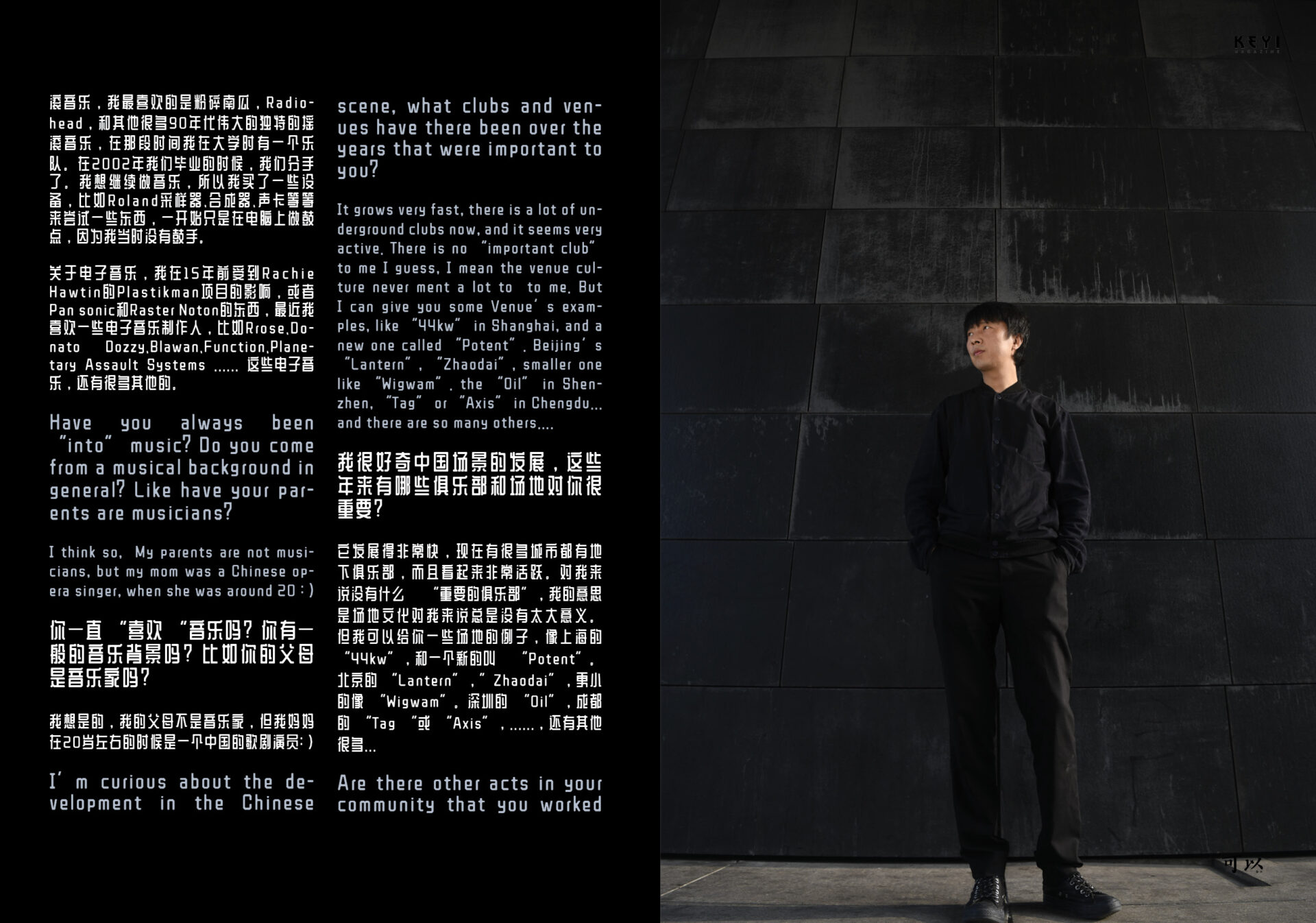
Are there other acts in your community that you worked together with, that are important to you?
Maybe not with musicians, because I work with my music just by myself. I had a long relationship with a Chinese director called Meng Jinghui in my early career, he is perhaps the most influential theatre director in China. I made the soundtrack and sound design for most of his plays. I think I learned a lot from this, for example how to control and balance the atmosphere in the show. I composed the soundtrack and played many many times live music. The drama audience is different from music fans, I did a lot of experimental sound in their “mainstream” shows, but in a way that was accessible to them. Another one is my visual partner Wang Meng, we have cooperated for over 10 years, he did most of the visuals for my live sets, it enlarged my music, or let’s say the visuals makes my show a full impact.
在你的社区中,是否有其他与你一起工作的行为,对你来说很重要?
音乐家方面也许不是,因为你知道我的音乐是由我自己来做的。
但在我的早期职业生涯中,我和一个叫孟京辉的中国导演有很长的关系,他可能是中国最有影响力的戏剧导演。我为他的大部分戏剧做了配乐和声音设计。我想我从中学到了很多东西,比如说如何控制和平衡剧中的气氛。我为现场音乐创作配乐,并多次播放。戏剧观众与音乐迷不同,我在他们的 “主流 “演出中做了很多实验性的声音,但都是以他们能接受的方式。
还有一个是我的视觉伙伴王蒙,我们已经合作了10多年,他为我的现场做了大部分的视觉效果,它扩大了我的音乐,或者说视觉效果让我的表演充满了冲击力。
Techno is such a big word, would you categorise your music as strictly that or would you like to use another more specific term?
I don’t like to categorize it, and I think my music is not the typical “Techno”. To me, when it can be categorized, I feel boring a little bit. If I choose a word, maybe Psychedelic electronics for this new album.
Techno是一个很大的词,你会把你的音乐严格归类为这个词,还是想用另一个更具体的词?
我不喜欢把它归类,我认为我的音乐不是典型的 “TECHNO”。 对我来说,当它可以被归类的时候,我觉得有点无聊。如果我选择一个词,也许是迷幻电子来形容这张新专辑。
Psychedelic Electronics sounds really exciting, I feel like it is a psychedelic experience to go to clubs and end up in trance like states for hours. Kind of cleansing and therapeutic. Do you feel like music has a larger impact on people than they might realize?
Sure, good music is the best alcohol, like a psychedelic sword.
迷幻电子听起来真的很刺激,我觉得去俱乐部,最后在恍惚的状态下待上几个小时,是一种迷幻的体验。有种净化和治疗的感觉。你是否觉得音乐对人们的影响比他们可能意识到的要大?
当然,好的音乐是最好的酒,就像一把迷幻的剑。
Tell us a bit about Dead J your previous moniker.
When I began to make electronic music early days, I went to some clubs in my hometown, the DJs are also MC, shouting something like “shake your head” combined with the loud music, it’s hard to me to describe in English, I thought the
DJ was dead. So I made a name Dead J, It’s like a humour, a paronomasia.
告诉我们一些关于Dead J的情况,你以前的绰号。
当我开始做电子音乐的早期,我去了我家乡的一些俱乐部,DJ也是MC,结合嘈杂的音乐喊着类似 “摇头 “的东西,我很难用英语来描述,我认为DJ已经死了。所以我起了一个名字叫Dead J,这就像一个幽默,一个副词。
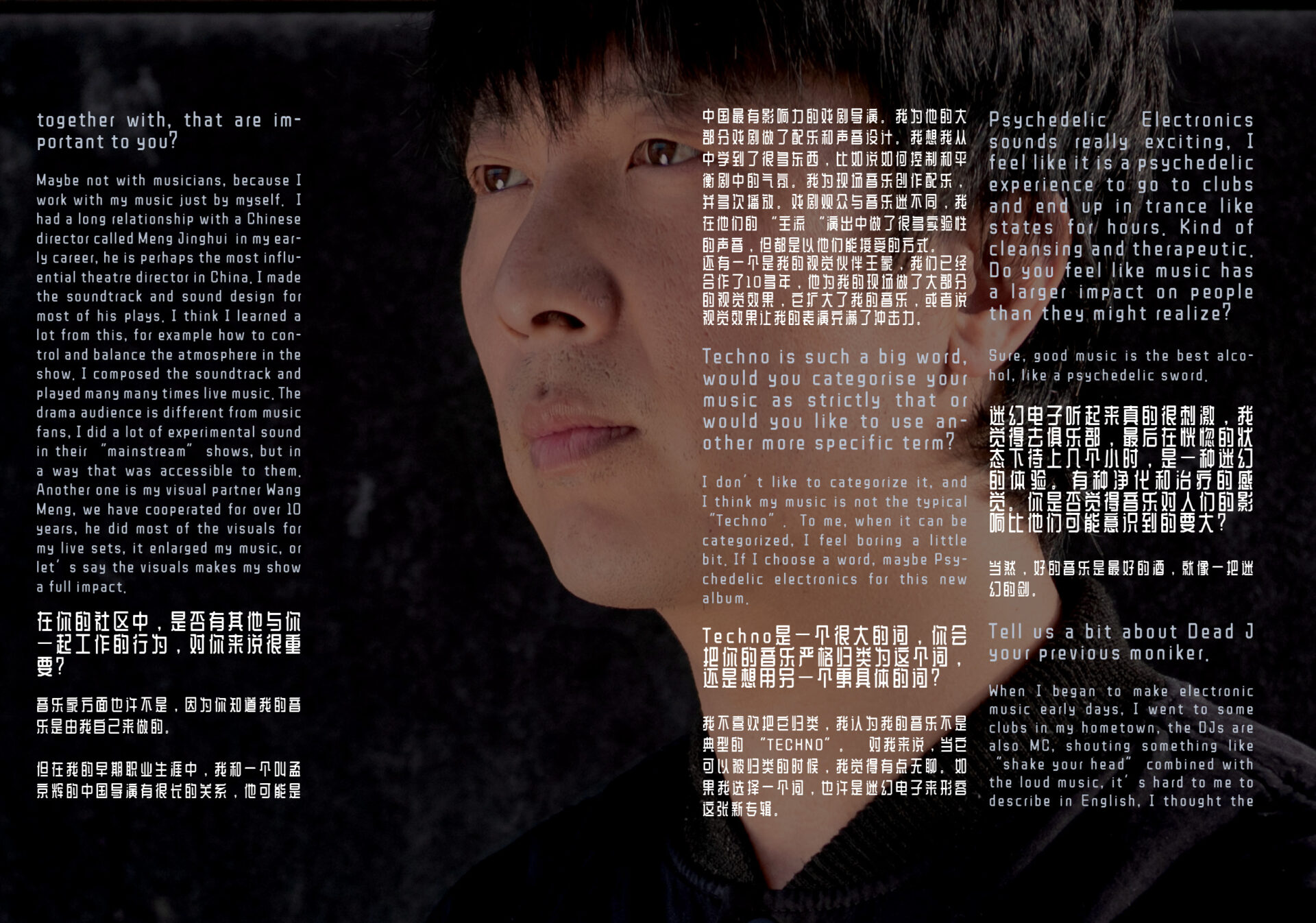
What is the difference between clubbing in Beijing and clubbing in Europe/US?
Europe has very different feeling, there is more audience, more freedom. For a lot of reasons, like the support from the government, like for example the building of Tresor – location was old power station in the city center, or Berghain pay lower tax… and also the drug culture, China is very strict about drugs, and also in china we don’t have the clubbing culture history compare to western world.
在北京的俱乐部和在欧洲/美国的俱乐部有什么不同?
欧洲有非常不同的感觉,那里有更多的观众,更多的自由。有很多原因,比如政府的支持,你知道的,比如Tresor的建筑位置是市中心的旧电站,或者Berghain交的税比较低……还有毒品文化,中国对毒品非常非常严格,而且在中国我们也没有比西方世界更多的俱乐部文化历史。
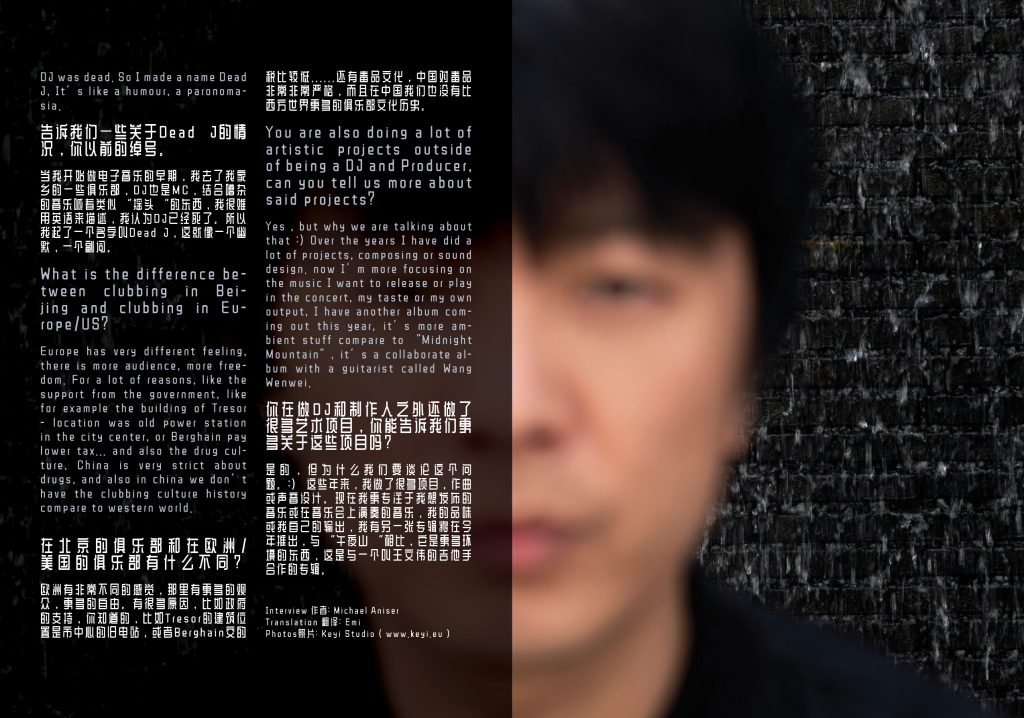
You are also doing a lot of artistic projects outside of being a DJ and Producer, can you tell us more about said projects?
Yes , but why we are talking about that 🙂 Over the years I have did a lot of projects, composing or sound design. now I’m more focusing on the music I want to release or play in the concert, my taste or my own output, I have another album coming out this year, it’s more ambient stuff compare to “Midnight Mountain”, it’s a collaborate album with a guitarist called Wang Wenwei.
你在做DJ和制作人之外还做了很多艺术项目,你能告诉我们更多关于这些项目吗?
是的,但为什么我们要谈论这个问题。:) 这些年来,我做了很多项目,作曲或声音设计。现在我更专注于我想发布的音乐或在音乐会上演奏的音乐,我的品味或我自己的输出,我有另一张专辑将在今年推出,与 “午夜山 “相比,它是更多环境的东西,这是与一个叫王文伟的吉他手合作的专辑。
Interview 作者: Michael Aniser
Translation 翻译: Emi
Photos照片: Keyi Studio ( www.keyi.eu )
LISTEN HERE SPECIAL MIX FROM SHAO:
https://soundcloud.com/keyimagazine/keyi-magazine-shao
ORDER PRINT COPIES HERE:







